Jeremie Averous's Blog, page 112
November 23, 2014
Next Public Speaking Occasions: Singapore and Oman
Following the publication of my last book, I will be speaking about Project Cost Control on the following occasions in the coming months:
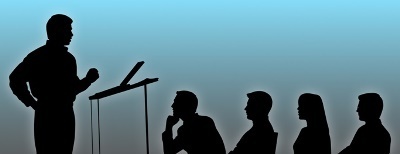 in Singapore with the Singapore Project Management Institute (SPMI) on Tuesday 2 Dec evening (7 to 9pm – NTUC Center – 1 Marina Boulevard) – click for details and registration.
in Singapore with the Singapore Project Management Institute (SPMI) on Tuesday 2 Dec evening (7 to 9pm – NTUC Center – 1 Marina Boulevard) – click for details and registration.in Muscat (Oman) for a full-day masterclass on Wednesday 25 February 2015 just following the Oman EPC Projects Summit – click for details and link to the conference website for registration.
Please join if you are interested by the topic or just to meet!

November 22, 2014
How to Avoid Despair – a Choice that is the Greatest Responsibility of Man
In his book On Becoming a Person, Carl Rogers refers to Kierkegaard. “He points out that the most common despair is to be in despair at not choosing, or willing, to be oneself; but that the deepest form of despair is to choose ‘to be another than himself‘. On the other hand ‘to will to be that self which one truly is, is indeed the opposite of despair‘, and this choice is the deepest responsibility of man“.
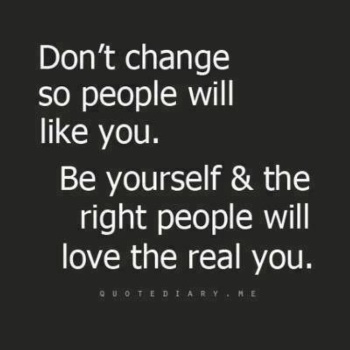 Who are you really? Who do you want to look like really? Is that you?
Who are you really? Who do you want to look like really? Is that you?
As I often observe, this tension is indeed a very critical element of people’s well being. Many dysfunctions of individuals can be explained by this gap between who they are and who they want to be.
And it is a choice for each of us. We can choose to stay the way we’ve been raised when other people were shaping us and maybe transferring their expectations upon ourselves. We can choose to try to fit so completely in society’s expectations. Or we can choose to be ourselves, which has some advantages regarding the congruence of our actions; avoids deep despair; but can be quite stressful in a social context.
Indeed it could be our deepest responsibility to make this fundamental choice: do we choose to be ourselves?
Ponder this choice for a moment. Be honest with yourself.
What did you choose?

November 20, 2014
How to Listen to the Language Of Our Physical Reactions
“Physical reactions are often the language through which we express painful feelings, especially when it isn’t safe to say them to the people we’re upset with. We often say with our bodies what we can’t or won’t say with our mouths.” – writes the psychologist Susan Forward in Toxic Parents.
 And these repressed feelings translate into various conditions of chronic pain, tension, insomnia and other symptoms. Just because we can’t say it with our mouth, it endures in our body.
And these repressed feelings translate into various conditions of chronic pain, tension, insomnia and other symptoms. Just because we can’t say it with our mouth, it endures in our body.
In the particular case of toxic or even abusive parents, Susan Forward’s approach is to enable to talk to the person. Granted it cannot always be a dialogue but the therapeutic impact of just being able to express one’s feelings on a difficult subject, in a calm manner, makes a lot of physical symptoms disappear (it might take quite a lot of time though to reach the stage when this single expression is possible).
If you suffer from some chronic pain that can’t be directly linked to a physical condition, consider whether you would not have some deep feelings repressed somewhere. Then consider how you could express these feelings, calmly, to the person concerned.

November 18, 2014
How Commercial Activities Are Part of the Most Creative Activities
I have come to realize that commercial activities – from business development to the development and the negotiation of a commercial deal or even the implementation of a general commercial model – are among those activities in a company that require the most creativity.
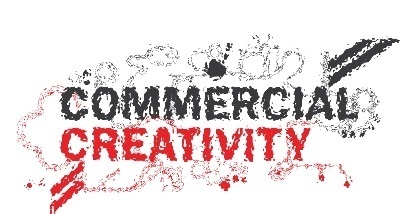 It requires creativity because first, it is all about creating something. Not the product of the company, of course, but another tangible deliverable that is essential: the commercial proposal, a document that will describe how we create value to the client or to the market in a way that will fit its needs.
It requires creativity because first, it is all about creating something. Not the product of the company, of course, but another tangible deliverable that is essential: the commercial proposal, a document that will describe how we create value to the client or to the market in a way that will fit its needs.
It is also creative because it requires to develop a solution to a particular issue, often while discussing with a client to understand its particular needs. And depending on the situation, our usual commercial approach might not be appropriate, and we need to demonstrate creativity in setting up a solution that will fit the constraints and the needs.
This observation about the fact that commercial activities are fundamentally creative activities have a lot of consequences on how they should be implemented – and on the profile of the people that should do them. Did you realize it?

November 15, 2014
Why We Should Take More Time to Enjoy Where We Are
“We’re so busy watching out for what’s just ahead of us that we don’t take time to enjoy where we are“. This quote is quite accurate I find (I am not sure about the attribution, it seems to be another internet wisdom pieces). Although I struggle too often to take the time.
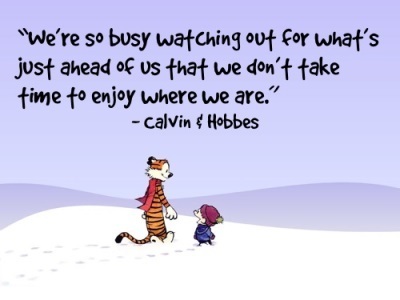 The interesting twist in this quote is that I probably don’t take enough time to enjoy the present moment because I am watching our for what is just ahead of me, but because I am looking to far away in the future (self-test shows that I am very future oriented from the time perspective).
The interesting twist in this quote is that I probably don’t take enough time to enjoy the present moment because I am watching our for what is just ahead of me, but because I am looking to far away in the future (self-test shows that I am very future oriented from the time perspective).
So it is not quite what is just ahead of me, but what is on the horizon that makes me move forward too fast.
And you? Do you take enough time to enjoy where you are right now?

November 13, 2014
Who is Wiser – Our Mind or our Body?
A lot of modern writings focus on the power of the ‘gut feeling‘, and intuition, and how following body perception and emotions can often be more effective than following our rational mind.
 In a similar approach, in the excellent novel around golf, ‘the Legend of Bagger Vance‘, Steven Pressfield writes: “Intelligence, I have told you, does not reside in the brain but in the hands. Let them do the thinking, they’re far wiser than you are“.
In a similar approach, in the excellent novel around golf, ‘the Legend of Bagger Vance‘, Steven Pressfield writes: “Intelligence, I have told you, does not reside in the brain but in the hands. Let them do the thinking, they’re far wiser than you are“.
Is our body really wiser than we are? Have we outgrown with our mind our body’s self-balance, and its ability to integrate experience to foster our decision-making?
I think we always need to remember that there are instances where we need to respond – where we have to positively exercise the choice to respond to what is happening, instead of reacting. And that requires our mind at work. It might be rare. It might not be in these situations where we have trained and repeated movements thousands, millions of times – situations where we’d better follow what our body wants to do without interfering. But as the body is wise in most instances, so is our mind the wisest overall even if it should interfere much less than it does usually. Even if it chooses only once in a while to decide against our body.

November 11, 2014
How to Manage Your Daily Reserve of Self-Control
“Self-control is a finite resource. You can only ask so much of yourself each day” – says Nick Crocker. He continues: “You’ll snap or warp or splinter if you ask too much. You have a limited capacity to direct yourself a certain way. It’s worth considering where that directive capacity goes every day“.
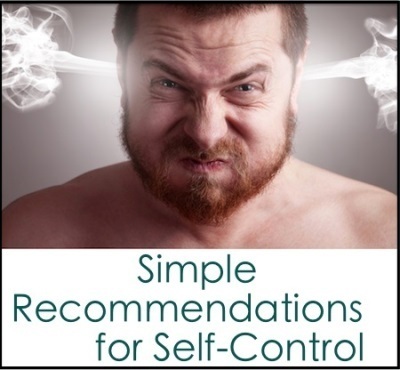 Seen from that perspective, we need to be careful in our utilization of self control and be wary not to exceed our capacity in a given day.
Seen from that perspective, we need to be careful in our utilization of self control and be wary not to exceed our capacity in a given day.
This probably means that if you realize you have used a fair bit early, you need to make sure you don’t put yourself in situations where significant self-control is required.
However I do believe that certain exercises of self-reflection and physical exercise can increase one’s self-control reserve when that is really needed.
In any case, if you feel you are exhausting your self-control reserves don’t explode yet! Maybe wait until the next day to tackle the new situation?

November 8, 2014
How to Avoid Suffering when Changing
“Pain is inevitable, suffering is optional” is quite a common quote. We need pain to change (and some pleasure to leverage the change). We can still avoid suffering.
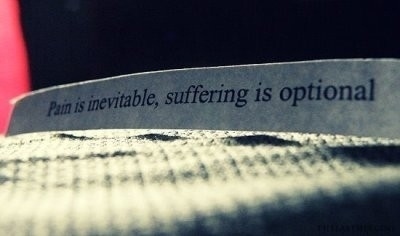 Suffering is very much a psychological effect. What makes the difference between pain (external) and suffering (internal) is that we can either react or respond; we can choose not to suffer even in the face of pain. And we have always the choice: “Between stimulus and response there is a space. In that space is our power to choose our response. In our response lies our growth and our freedom.” says Viktor Frankl (ref our post ‘How We Always Have a Choice, Even in the Worst Situation‘).
Suffering is very much a psychological effect. What makes the difference between pain (external) and suffering (internal) is that we can either react or respond; we can choose not to suffer even in the face of pain. And we have always the choice: “Between stimulus and response there is a space. In that space is our power to choose our response. In our response lies our growth and our freedom.” says Viktor Frankl (ref our post ‘How We Always Have a Choice, Even in the Worst Situation‘).
Change will come with pain. It should not come with suffering or bitterness. You can choose not to let it happen. Choose.

November 6, 2014
Why Pleasure Can Accelerates Change (only Together with Pain)
It is quite commonplace to state that pain is required for change, and that change occurs when the pain to change is less than the pain to stay in the same condition.
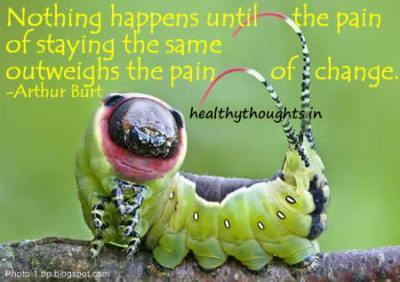 Tony Robbins says that we need in addition to access some kind of leverage to accelerate change. That pain is required for change. And thus, “to access leverage, you must help someone associate massive PAIN to not changing NOW, and massive PLEASURE to changing immediately. The motivation is based on both pain AND pleasure. Pain is short-term motivation, but you need the pleasure side for long-term motivation.”
Tony Robbins says that we need in addition to access some kind of leverage to accelerate change. That pain is required for change. And thus, “to access leverage, you must help someone associate massive PAIN to not changing NOW, and massive PLEASURE to changing immediately. The motivation is based on both pain AND pleasure. Pain is short-term motivation, but you need the pleasure side for long-term motivation.”
He continues, “The truth is everyone in life has developed different strategies or patterns for getting out of pain and into pleasure. Thus, if we want to create permanent and consistent change, what we must do is develop a new set of patterns of how to get out of pain and into pleasure. In other words, in order to create lasting change, we must use pain to get people’s attention and energize them to want to make the change, but then we must link pleasure to the new pattern to make it last”
To create change, do not just highlight the pain of not changing – entice the change with immediate and future pleasure. A new way to design Change Management plans?

November 4, 2014
How Employee Engagement though Empathy is the Ultimate Competitive Advantage
Hugh McLeod at Gapingvoid says: “Employee engagement is the ultimate competitive advantage. Unlike other advantages that can be bought and sold, this one is a bit trickier. It has to be inspired“.
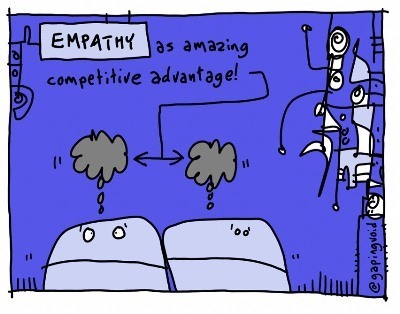 And true enough I lived through a number of instances where employees where fully engaged in the organization – often through decisive acts of leadership from its leaders, and that really made a difference.
And true enough I lived through a number of instances where employees where fully engaged in the organization – often through decisive acts of leadership from its leaders, and that really made a difference.
Where Hugh makes a point though is that engagement is not just about leadership and inspiration. It is about creating empathy between the participants to the adventure. And thereby creating stories, the stories of the adventures of this group of people.
“Stories in business are especially powerful because they can unite everyone on a common mission. Tell everyone the story of how you got to where you are – and they’ll likely take over the rest. After all, the best books ask us to imagine our own endings…”
What about creating your own ending to the project you are on, together as a group full of mutual empathy?




